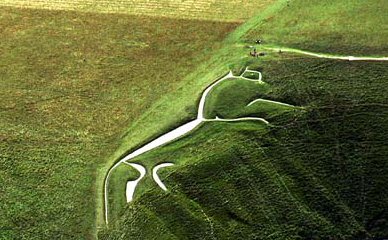Dragon Hill
Above: Dragon Hill is the small hillock immediately below the ridge carrying the White Horse of Uffington. Legend asserts it to be where St George slew the dragon and a patch of chalk on its summit, on which no grass will grow, is said to be where the dragon’s blood was spilt. It is also said to be the burial place of Uther Pendragon.
DP: I would say that pubs are part of the culture too. How would you define culture?
EV: Culture is about your identity, so, I think there is still a thing called British culture, and there’s obviously English culture, Welsh culture, Scottish culture, Irish culture. It’s about your identity, it’s about sense of place, it’s about what makes you feel rooted in your community. So we talked earlier about Alfred. He suffuses the local area’s culture. I think there’s a culture created by centuries of history around here, that you can feel oozing up through the fields. Having the Iron Age forts and the burial mounds, and the White Horse on the Ridgeway, which I pass most days, reminds you of how long Man has been cultivating this area. The old buildings that remind you of what’s been here before are very important too. People here do feel very loyal to this part of the world. Some still refer to it as ‘Occupied North Berkshire’. They feel a real sense of identity and affinity and still, surprisingly, in the 21st century I will meet people who illustrate that. Where I used to live, down the road, there’s a chap who was born in the village. He’s 80 years old, he’s been married for 60 years, he’s never been to London. There are still people around who are very much part of this community, who haven’t let the modern world overtake them.
DP: There is something that oozes up in the rolling countryside of southern England. It is something that’s endemic to us. The English love nature and they do love their countryside and I’m seeing it disappearing in many ways. The house I live in was in the country – fields, woods, orchards, the whole lot – and now it’s all gone, housing estates all the way around. It’s easy to speak of it as progress but with the population now increasing by over half a million people a year, where does it end? It’s quite a question. The pit with the stake in it.
EV: It’s terrifying, isn’t it? On the one hand, it’s a great compliment to England and our way of life that people want to come and live here but certainly I know the strain in London in terms of primary school places. There’s a strain here in terms of primary school places. The South is this great economic engine that drives the rest of the country, so people want to come and live here. One of the reasons we want to put in High Speed 2, for example, and modernise the infrastructure of the UK is to ensure that it isn’t always essential that you base yourself in the South East to succeed in business. To knit the country closer together to help spread the economic wealth is very important.

DP: How do you think this will affect us culturally? I’m thinking in terms of ten or eleven Andovers being put on the map, year after year.
EV: I think it’s an issue. We shouldn’t stick our heads in the sand and say you can never build new houses here. There will be new houses built here, and one of the reasons is because we shouldn’t necessarily say we’re going to pull up the ladder after us. People come to this part of the world and just as there people, like I mentioned, who’ve been here all their lives, there are also a lot of incomers from different parts of the country and from abroad. They come here because of the quality of life, they come here for the jobs, they help drive the innovation and economic success of this part of the world.
